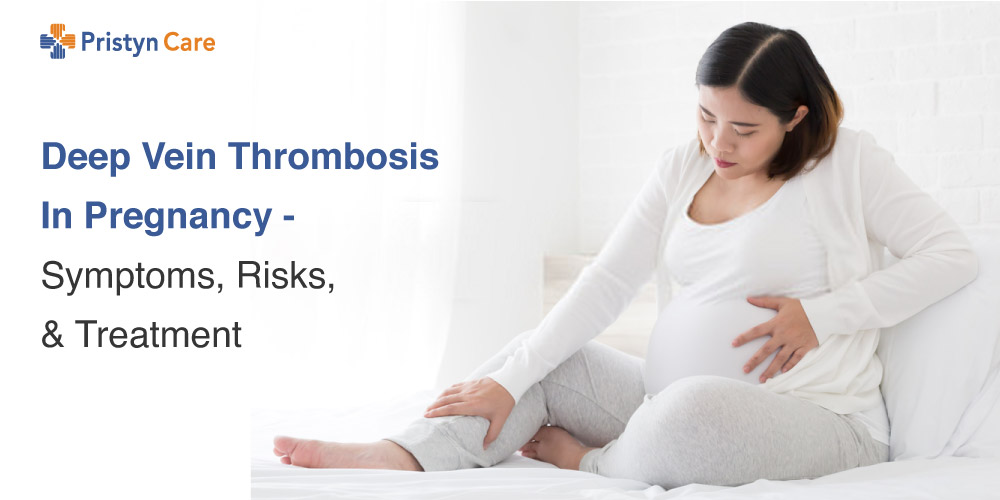
Deep vein thrombosis or DVT occurs when blood clot(s) form in the deep-seated veins. It is common to occur in the legs during pregnancy due to increased pressure or strain on the lower body. These blood clots can have serious consequences when not attended in time.
Table of Contents
Symptoms of Deep Vein Thrombosis During Pregnancy
People suffering from deep vein thrombosis experience symptoms like intense pain, cramping, burning sensation, and discoloration of the skin around the blood clot. Other symptoms of DVT include heaviness in the legs, dark-colored bulging veins, and warmth in the affected skin area.
Sometimes, the symptoms can be so severe and intense that the person may have to immediately rush to the doctor. Pregnant women suffering from varicose veins are at higher risk of encountering DVT.
Why does deep vein thrombosis occur during pregnancy?

Although any person can develop deep vein thrombosis, pregnant women are at greater risk because of a number of factors that can affect the flow of blood in the body.
Firstly, during pregnancy, a woman undergoes a number of hormonal changes. These hormonal changes can make the vein walls and valves smooth. This can lead to impaired functioning of the vein walls and valves.
Also, the volume of blood inside the woman’s body increases during pregnancy to sustain both the mother and the child. The number of veins, however, remains the same. Simultaneously, a significant increase in body weight is also seen. Both these factors combined increase the pressure on the veins and can lead to venous insufficiency, eventually leading to problems like varicose veins and deep vein thrombosis.
Another reason why pregnant women are more susceptible to developing varicose veins is that in the final months of pregnancy, the clotting ability of the woman’s blood increases and the anti-clotting proteins reduce. This happens to prevent too much bleeding during childbirth. However, sometimes, the clotting proteins can increase a lot more than usual and the blood cells can clump together to form clots in the veins.
What are the risks associated with deep vein thrombosis during pregnancy?

Deep vein thrombosis usually doesn’t cause any major symptoms. It doesn’t pose any risk to the unborn baby unless any serious complications arise.
Some of the common risks of prolonged deep vein thrombosis include:
- Permanent swelling in the veins
- Fluid Retention
- Chronic Venous Insufficiency (venous valves not functioning right)
- Pulmonary Embolism (Serious emergency condition in which the blood clot reaches the lungs)
Thus, to avoid any complications or harm to the baby, it is better to stay in touch with a doctor and undergo the necessary treatment.
Treatment of deep vein thrombosis during pregnancy

The treatment of deep vein thrombosis during pregnancy is not very complex. You may have to consult a hematologist and a vascular specialist along with your regular gynecologist. The doctors will prescribe anticoagulation therapy to dissolve the blood and provide fast relief from the symptoms.
In anticoagulation therapy, you will have to take heparin and some other injections. Heparin prevents the existing clot from growing, stops new clots from forming, and dissolves the existing clots by making the blood thinner.
You may have to take these injections for the rest of your pregnancy. The doctor will stop the therapy 2-3 weeks before your delivery. However, there is a great risk of deep vein thrombosis postpartum. Therefore, you may have to take heparin for about 6 weeks after delivery as well.
Don’t worry, heparin is safe. It does not cross the placental lining and thus does not have any negative effects o the pregnancy at all.
Is the surgery for deep vein thrombosis safe during pregnancy?
Surgery for deep vein thrombosis is not recommended during pregnancy. But, if the problem persists even after anticoagulation therapy, you can discuss it with your doctor and undergo surgery a few months after delivering the child.
The best and most effective surgery for deep vein thrombosis is thrombectomy. In this treatment procedure, the surgeon removes the blood clots present in the veins with the help of special tools. If necessary, a vena cava filter (IVC filter) is also placed inside the body to prevent the blood clots from entering the bloodstream.
(Also Read: Advantages and benefits of laser treatment of varicose veins)

It is a simple procedure that does not require any major cuts or incisions and is thus 100% safe as well. The recovery period for laser treatment is short and you’ll be good to go back to your normal life within a week.
Pristyn Care is associated with some of the best gynecologists and vascular specialists in the country. So if you have any queries about deep vein thrombosis treatment during pregnancy, you can get in touch with a Pristyn Care specialist. And if you are currently dealing with deep vein thrombosis, do not delay. Book your online appointment and receive the best treatment at Pristyn Care.
Some tips to prevent the recurrence of deep vein thrombosis
- Make sure that you avoid wearing heels and choose comfortable flat footwear to avoid excess pressure on the veins and calf muscles.
- Keep yourself hydrated. Having caffeinated and carbonated beverages that have dehydrating effects on the vascular system, making them prone to deep vein thrombosis.
- If you have a history of deep vein thrombosis, you can consult your doctor and take some preventive anti-coagulating medicines.
- Keep your legs moving. This will ensure the proper circulation of blood in the veins and prevent the blood cells from clumping together.
- Wear compression stockings for 8-10 hours a day during pregnancy after consulting the doctor. Remember to remove them while sleeping.
- Increase the consumption of tomatoes, nuts, cayenne pepper, red and green bell pepper to prevent the clotting of blood in the veins (Also read: Deep vein thrombosis treatment at home)
The Bottom Note
Deep vein thrombosis is not a casual health problem that you can neglect. Avoiding medical treatment can have serious implications and may even affect the growth of your unborn baby. The earlier deep vein thrombosis is diagnosed, the lesser are the chances of complications. Therefore, it is better to get in touch with a specialist as soon as you notice the symptoms and then undergo proper medical treatment.
So if you are struggling with the troubles of deep vein thrombosis, no need to struggle anymore. Contact Pristyn Care and say goodbye to the pain and discomfort of deep vein thrombosis.
Also Read:







